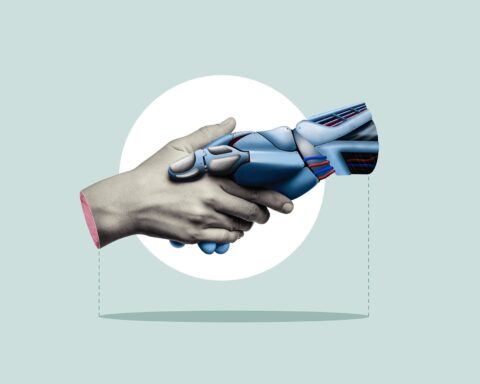By Andrew Amann, CEO of NineTwoThree Venture Studio, a two-time Inc. 5000 Fastest Growing Company. Andrew and his team have created 50+ products and 14 startups.
There’s no denying that the natural language processing chatbot ChatGPT has become one of the most popular AI-powered applications unleashed on the public at large. Developed by the artificial intelligence lab OpenAI, ChatGPT effectively carries on a conversation with users with its ability to understand and compose text.
Needless to say, ChatGPT and other similar tools under the generative AI banner offer potential for entrepreneurs struggling to fund operations for their emerging businesses. While the technology remains in a still-maturing state (news about inaccuracies is a regular occurrence), it offers an opportunity to improve the productivity of a startup’s limited number of employees. Intriguing use cases abound, potentially benefiting businesses of all sizes, but especially smaller organizations.
So let’s take a closer look at generative AI and its possibilities for the entrepreneur. I think entrepreneurs should get ready for a wave of AI-powered tools to truly revolutionize the overall business world. Notably, it boasts the potential to be a bigger technology innovation than the cloud and smartphones.
A High-Level Overview Of Generative AI
Simply stated, ChatGPT leverages an underlying machine learning model to perform natural language processing (NLP). A massive amount of intriguing business use cases result from the use of generative AI tools.
The GPT acronym means “generative pre-training transformer,” with ChatGPT and other generative AI tools relying on a rigorous training process for the underlying machine learning models. It leverages an internal database laden with phrases and words, facilitating the understanding of language patterns. AI has the ability to generate phrases, sentences, paragraphs and even longer content. Put another way, it’s a chatbot on steroids.
Notably, generative AI offers significant functionality for any business process related to written communication. Applications like language translation or more powerful types of chatbots often only scratch the surface of these possibilities. Text-based generative AI tools provide a natural flow of language, differentiating themselves from earlier examples of this form of artificial intelligence.
What Generative AI Offers The Entrepreneurial Community
Even with a potential recession looming and massive layoffs at some businesses, many startups still find it difficult to source all the talent they need to bootstrap their operations. The fact that generative AI provides an opportunity to make a small staff more productive provides a sense of the promise of AI tools. The tech allows startups to optimize their operations at a critical time when considering their long-term viability.
Of course, current AI tools outside of NLP also provide significant advantages to businesses of all sizes. In some cases, AI powers the robotic process automation applications used to automate a variety of tedious and repetitive business processes. At larger businesses, this approach often serves to assist current employees as opposed to replacing them. However, startups may benefit from having a smaller group of employees accomplish more, as highlighted earlier. Generative AI can expand the number of use cases where automation makes a difference.
Not surprisingly, the functional areas currently benefiting from generative AI are typically text-based. For a startup business, this includes data entry, generating marketing copy, appointment scheduling and more. Once a startup’s product or service is launched, the chatbots provided by generative AI provide the ability to handle a significant portion of the customer service role. Adopting this approach simply allows a startup to accomplish more with fewer employees.
While generative AI tools like ChatGPT offer many benefits, there are also drawbacks that startup leaders should be aware of. ChatGPT has been known to produce inaccurate information or generate information that doesn’t match the user’s query. Due to the way generative AI models are trained, there is also an inherent risk of bias. While silos and prompt engineering can overcome some of these limitations, generative AI isn’t ready for applications that may involve sensitive customer interactions where small mistakes can create large issues.
Best Practices For Implementing AI
The current hype and potential opportunities surrounding AI mean many entrepreneurs are eager to get involved. However, rather than rushing to implement AI, I suggest business leaders set realistic expectations and goals for AI and understand the limitations of the technology.
Also, be prepared to deal with the challenges of AI implementations, including development and maintenance costs and the lack of skilled talent. Some best practices for implementing AI include:
• Start with your “why.” Start small and focus on the specific use cases where AI could have the most significant impact on your company.
• Be strategic about how the model behaves. Create a great prompt that explains to the model what you want the results to look like; then add a filter to the results to ensure your customers get “on-brand” experiences.
• Focus on finding the right balance of employees and technology. Identify areas where AI can complement human skills rather than replace them.
• Address AI’s limitations. Establish clear guidelines and quality control processes to address inaccuracies or biases in any AI-generated content.
• Fill AI skills gaps. Invest in training and upskilling to teach your employees how to use AI effectively.
The Future Of Generative AI In The Entrepreneurial World
Notably, other forms of generative AI actually create videos, images and other rich media content. The early reviews of initial efforts in this area reveal much work still needs to happen, but I think entrepreneurs need to be aware of the significant potential. Additionally, many make the argument that ChatGPT still requires more work to improve its overall accuracy.
Whatever the future of generative AI, it remains clear that these tools provide significant opportunities for startups, especially when it comes to NLP. It behooves any entrepreneur to pay close attention to the advancements in this area of AI and machine learning. In addition to the potential to inspire fresh ideas for new businesses, it could also help startups run more efficiently and effectively.
[ad_2]
Source link
















